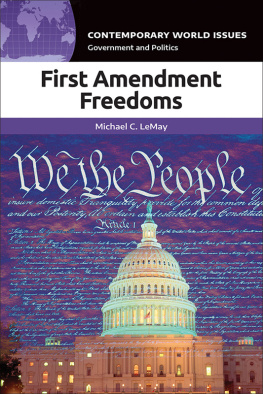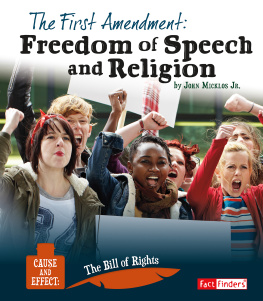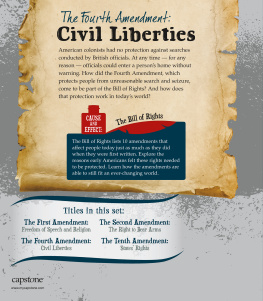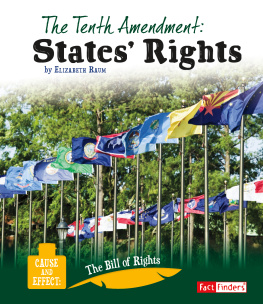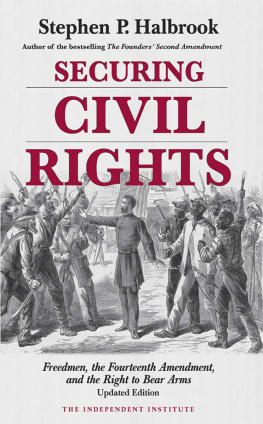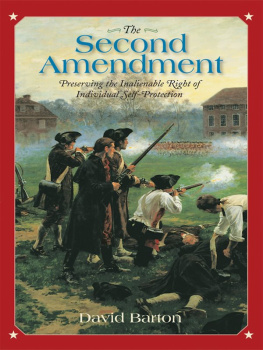First Amendment Freedoms
Recent Titles in the
CONTEMPORARY WORLD ISSUES
Series
Birth Control: A Reference Handbook
David E. Newton
Bullying: A Reference Handbook
Jessie Klein
Domestic Violence and Abuse: A Reference Handbook
Laura L. Finley
Torture and Enhanced Interrogation: A Reference Handbook
Christina Ann-Marie DiEdoardo
Racism in America: A Reference Handbook
Steven L. Foy
Waste Management: A Reference Handbook
David E. Newton
Sexual Harassment: A Reference Handbook
Merril D. Smith
The Climate Change Debate: A Reference Handbook
David E. Newton
Voting Rights in America: A Reference Handbook
Richard A. Glenn and Kyle L. Kreider
Modern Slavery: A Reference Handbook
Christina G. Villegas
Race and Sports: A Reference Handbook
Rachel Laws Myers
World Oceans: A Reference Handbook
David E. Newton
Books in the Contemporary World Issues series address vital issues in todays society such as genetic engineering, pollution, and biodiversity. Written by professional writers, scholars, and nonacademic experts, these books are authoritative, clearly written, up-to-date, and objective. They provide a good starting point for research by high school and college students, scholars, and general readers as well as by legislators, businesspeople, activists, and others.
Each book, carefully organized and easy to use, contains an overview of the subject, a detailed chronology, biographical sketches, facts and data and/or documents and other primary source material, a forum of authoritative perspective essays, annotated lists of print and nonprint resources, and an index.
Readers of books in the Contemporary World Issues series will find the information they need in order to have a better understanding of the social, political, environmental, and economic issues facing the world today.
CONTEMPORARY WORLD ISSUES
First Amendment Freedoms
A REFERENCE HANDBOOK
Michael C. LeMay

Copyright 2021 by ABC-CLIO, LLC
All rights reserved. No part of this publication may be reproduced, stored in a retrieval system, or transmitted, in any form or by any means, electronic, mechanical, photocopying, recording, or otherwise, except for the inclusion of brief quotations in a review, without prior permission in writing from the publisher.
Library of Congress Cataloging-in-Publication Data
Names: LeMay, Michael C., 1941- author.
Title: First amendment freedoms : a reference handbook / Michael C. LeMay.
Description: Santa Barbara, California : ABC-CLIO, [2021] | Series: Contemporary world issues | Includes bibliographical references and index.
Identifiers: LCCN 2020035782 (print) | LCCN 2020035783 (ebook) | ISBN 9781440869297 (hardcover) | ISBN 9781440869303 (ebook)
Subjects: LCSH: United States. Constitution. 1st Amendment. | Freedom of speechUnited States. | Freedom of the pressUnited States.
Classification: LCC KF4770 .L46 2021 (print) | LCC KF4770 (ebook) | DDC 342.7308/5dc23
LC record available at https://lccn.loc.gov/2020035782
LC ebook record available at https://lccn.loc.gov/2020035783
ISBN: 978-1-4408-6929-7 (print)
978-1-4408-6930-3 (ebook)
25 24 23 22 21 1 2 3 4 5
This book is also available as an eBook.
ABC-CLIO
An Imprint of ABC-CLIO, LLC
ABC-CLIO, LLC
147 Castilian Drive
Santa Barbara, California 93117
www.abc-clio.com
This book is printed on acid-free paper 
Manufactured in the United States of America
Contents
The Bill of Rights, the first ten amendments to the U. S. Constitution, is one of the most important features of the American system of government. And the First Amendment is, arguably, the most important, contested, controversial, and consequential amendment of the Bill of Rights. The First Amendment consists of a bundle of rights crafted in several clauses: the freedom of religious expression, antiestablishment of a national religion, the freedom of assembly and the right to protest and to petition the government for redress, the freedom of the press, and the freedom of speech. Each of these clauses is stated rather simply, and they were originally interpreted to only apply to the federal government. Over more than two hundred years, the meanings and the constraints on government implicit in the First Amendment have been expanded upon, applied to all levels of American government, and been hotly contested in American politics.
Through adjudication involving a sizable number of federal cases, and particularly keylandmarkSupreme Court case decisions, the First Amendment prohibitions against government have been clarified. Actions taken by federal, state, and local authorities have been challenged and often found to be unconstitutional on the basis of First Amendment rights. The U.S. Congress has passed subsequent legislation expanding the meaning of those First Amendment freedom rights. The issue has also been impacted by executive orders and by U.S. treaty provisions, which have the force of law.
As the United States grew in size and power and its stature and influence in world politics expanded, the country became increasingly diverse in its population demographics. Those developments led to many issues and problems that had to be addressed and resolved with respect to the meaning of the prohibitions established by the First Amendment. Solutions to some problems appropriate to a given time and place had, on occasion, unintended consequences resulting in new problems that had to be resolved anew.
First Amendment Freedoms examines the politics of those fundamental freedoms. Like all volumes in the Contemporary World Issues series, this one is aimed at general readers and high school, college, and university students. It follows an established format for all volumes in the series.
discusses the history and background of the establishment of the First Amendment and traces the conflicts that the amendment generated in American politics and how those conflicts expanded and changed the understanding of those fundamental rights and privileges, first with regard to citizens and then to persons residing within the United States. The chapter provides a thorough examination of the economic, political, and social contexts surrounding American societys sense of what freedoms are guaranteed by the First Amendment and how those guarantees impact and limit the actions of government at all levels. It presents the discussion in a comprehensive and unbiased manner, allowing readers to reach their own judgments on the issues.
outlines some of the more problematic concerns related to the First Amendments guaranteed freedoms. It discusses why those issues arose and why they pose such difficulty for effective policy making to ensure those fundamental rights. It addresses the efforts taken at all levels of government to cope with the problems. It details specific actions taken to date and discusses some proposed solutions to those problems that are on the agenda of government, especially at the national government level.
is composed of original essays contributed by scholars and activist stakeholders involved in the politics of First Amendmentbased fundamental freedoms. The chapter brings together voices from diverse disciplinary perspectives to examine many sides of the topic and to enrich the perspectives that the books primary author is able to provide.

